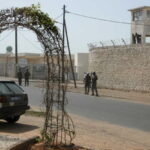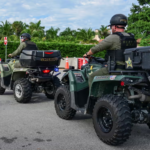Lebanon is teetering on the brink as fears of an Israeli ground invasion in the country’s south have been realized. In recent days, many Lebanese had already sensed the escalation was inevitable after Israel signaled that its campaign against Hezbollah would not end with the killing of Hassan Nasrallah, the group’s leader for the past three decades.
The Israeli military has described its move as a “limited, localized, and targeted” operation, but the fear on the ground is that this could spiral into a broader conflict. History has shown how Israeli forces can enter Lebanon easily but struggle to withdraw without igniting a deeper crisis.
“The country is lost,” one Lebanese citizen texted me. Another wrote, “Long and hard days are ahead.” The mood across the country is one of uncertainty and dread, with many believing history is repeating itself. The intensity of Hezbollah’s response has lessened, though the group continues to launch rockets into Israel.
Lebanon, already straining under the weight of casualties from Israeli airstrikes and over a million displaced residents, faces an uncertain future. Hezbollah, a Shia Muslim group armed and financed by Iran, is both a political force and militia, deeply embedded in Lebanese society. Despite relentless Israeli airstrikes and high-profile assassinations, the group remains defiant. In a recent speech, Naim Qassem, Hezbollah’s deputy leader, declared the group’s readiness to resist any Israeli incursion.
Though Hezbollah holds considerable power, often described as a “state within a state,” Lebanon’s central government has little control over its actions. Many Lebanese outside Hezbollah’s base of support worry the country is being dragged into a conflict it did not choose, even as it struggles with an economic collapse and a nearly two-year political deadlock that has left the country without a president.
The memories of the 2006 war between Israel and Hezbollah are still fresh. Back then, southern Lebanon and Beirut’s Dahieh neighborhood, Hezbollah’s stronghold, were devastated. Now, some see a weakened Hezbollah, a group they accuse of prioritizing its own interests and those of Iran over the needs of Lebanon. As the most powerful faction within the Iran-backed Axis of Resistance, Hezbollah’s strength has been crucial for Tehran’s deterrence strategy against Israel, particularly regarding its nuclear facilities.
For many Lebanese, this conflict feels like a double-edged sword. Outside a building in central Beirut hit by an Israeli strike, one resident expressed frustration: “I’m against Israel, who is killing us, but I’m against Iran, who is killing us as well.”
But Hezbollah supporters remain staunch in their loyalty. “We shed tears of blood over the [Israeli] strike on Nasrallah,” one supporter said after fleeing Dahieh. “He’s irreplaceable. We don’t fear Israel. We’re still standing.”
As Lebanon braces for what lies ahead, the country stands at a crossroads, caught between foreign interests and the struggle for its own survival.









